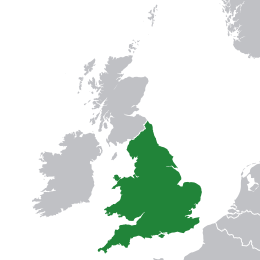More languages
More actions
| Kingdom of England | |
|---|---|
| 927–1707 | |
 | |
| Capital | London |
| Dominant mode of production | Feudalism (10th–17th century) Capitalism (17th–18th century) |
| Government | Monarchy |
The Kingdom of England was a medieval and early modern state located on the island of Great Britain. It limited the power of feudal barons by largely relying on mercenaries rather than knights, which gave it a military advantage against France and other countries.[1]
History
The Black Death spread to Europe in 1348 and killed a third of the total population. Peasants led by Wat Tyler rebelled in 1381, made an alliance with sections of the urban population, and confronted the King. Following the Wars of the Roses, the Tudor dynasty took power in 1485 and centralized power while strengthening Parliament and decreasing the power of the feudal lords.[1]
Protestant Reformation
Under the influence of the early bourgeoisie, Henry Tudor broke away from the Catholic Church in the 1530s, selling monastery lands to the gentry. His successor, Mary Tudor, failed to restore Catholicism, and Protestantism became the official religion of England. In 1588, Queen Elizabeth defeated the Spanish armada which was attacking the Netherlands during its bourgeois revolution.[2]
English Revolution
In 1629, James Stuart dissolved the Parliament and aligned with Catholic powers. His successor, Charles, attempted to impose Anglican Protestantism on Scotland, which caused a war from 1637 to 1639. Charles resurrected Parliament to try to get funds for the war, but they refused to support him. In 1641, a fight broke out in Westminster between monarchists and progressive protestors. The House of Commons then impeached and arrested twelve leading bishops.
In January 1642, Charles entered the House of Commons and attempted to organize a coup before fleeing to set up a rival capital at Oxford. Royalists still controlled one-third of the House of Commons and two-thirds of the House of Lords. In 1645, Parliament banned its members from holding military commands. Oliver Cromwell emerged as a leading revolutionary and defeated all monarchist resistance by 1646.[2]
References
- ↑ 1.0 1.1 Neil Faulkner (2013). A Marxist History of the World: From Neanderthals to Neoliberals: 'European Feudalism' (pp. 86–88). [PDF] Pluto Press. ISBN 9781849648639 [LG]
- ↑ 2.0 2.1 Neil Faulkner (2013). A Marxist History of the World: From Neanderthals to Neoliberals: 'The First Wave of Bourgeois Revolutions' (pp. 100–109). [PDF] Pluto Press. ISBN 9781849648639 [LG]


